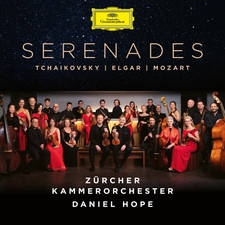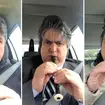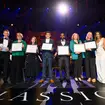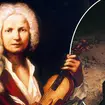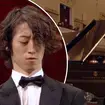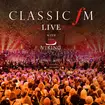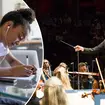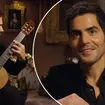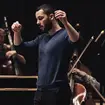The Full Works Concert - Thursday 5 September 2013
Rachmaninov's fiendishly difficult third piano concerto is on the menu tonight, along with a Schubert symphony and a Serenade from Elgar.
Tonight's concert opens with the overture to Mozart's opera, The Marriage of Figaro. Like a small swarm of bees bursting out from the orchestra pit, the overture's fizziness gets you ready for the fast-paced, acerbic comedy to follow.
Until 1996, Rachmaminov's third piano concerto was largely eclipsed by its older sibling, the famous Piano Concerto No. 2 – but the gap between the two narrowed with the release of the film Shine. The movie told the true story of the Australian concert pianist David Helfgott, who suffered a mental breakdown and abandoned his career for many years. ‘Rach 3’, as it’s often referred to by pianists, is used powerfully on the soundtrack and the Oscar-winning success of the film ensured a new audience for this muscular, Romantic work.
A vocal interlude follows with Luciano Pavarotti in fine form singing Ernesto de Curtis's Torna a Surriento.
Elgar's Serenade in E minor for Strings is the earliest work by the composer to have become well known – it preceded the ‘Enigma’ Variations by six years. The opening movement is marked 'piacevole', which means ‘pleasing’. The second movement was heard first in Hereford in 1893 and all three movements were eventually performed in Antwerp three years later. Elgar identified the Serenade as his favourite work and included it as one of his last gramophone recordings the year before he died.
The least known work on tonight's programme is the Cello Concerto No.4 in B flat major by John Garth (1721-1810). Garth played the cello and organ, composed, taught and organised concerts. His six cello concertos were all written as a vehicle for him to demonstrate his abilities as a cellist and were quite a novelty - concertos for solo instruments were quite rare in England at this time.
Tonight's concert concludes with Franz Schubert's Symphony No.1 in D major. It was composed in 1813, when Schubert was just 16 years old. Despite his youth, it is an impressive piece of orchestral music. It's performed tonight by Claudio Abbado conducting the Chamber Orchestra of Europe.
Wolfgang Amadeus Mozart: The Marriage of Figaro – Overture
Daniel Barenboim conducts the Berlin Philharmonic Orchestra
Sergei Rachmaninov: Piano Concerto No.3 in D minor
Piano: Leif Ove Andsnes
Paavo Berglund conducts the Oslo Philharmonic Orchestra
Ernesto de Curtis: Torna a Surriento
Tenor: Luciano Pavarotti
Giancarlo Chiaramello conducts the National Philharmonic Orchestra
Edward Elgar: Serenade in E minor for Strings
Paul Goodwin conducts the English Chamber Orchestra
John Garth: Cello Concerto No.4 in B flat major
Cello: Richard Tunnicliffe
Avison Ensemble
Franz Schubert: Symphony No.1 in D major
Claudio Abbado conducts the Chamber Orchestra of Europe
